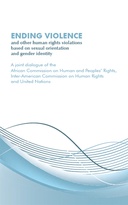Explore

Ending violence and other human rights violations based on sexual orientation and gender identity: A joint dialogue of the African Commission on Human and Peoples’ Rights, Inter-American Commission on Human Rights and United Nations
0 Ungluers have
Faved this Work
Login to Fave
About the publicationOver the years, the African, Inter-American and United Nations human rights systems have forged important partnerships on a wide-range of human rights issues and approaches. Grounded in the universality of human rights, the three systems have collaborated through actions ranging from joint statements to joint meetings and country visits, the exchange of information on country situations, individual cases and thematic issues, as well as relying on each other’s case law, decisions and procedural developments.This collaboration has been anchored in frameworks such as the 1993 Vienna Declaration and Programme of Action, the regular dialogue between global and regional human rights mechanisms mandated by the Human Rights Council, the 2009 Memorandum of Understanding between the Organisation of American States and the African Union, the 2012 Addis Ababa Roadmap between the special procedures of the UN Human Rights Council and those of the African Commission on Human and Peoples’ Rights and the 2010 and 2014 Memorandums of Understanding between the Office of the UN High Commissioner for Human Rights and the African Union Commission and Inter- American Commission on Human Rights, respectively.The joint dialogue held on 3 November 2015 in Banjul was firmly located within these frameworks. This timely dialogue enabled each institution to exchange information and experiences, to review approaches, challenges and good practices within each system, and to reaffirm our common resolve to address the serious human rights violations based on sexual orientation and gender identity that take place in all regions.This report and the accompanying background papers capture the content and outcomes of the joint dialogue. We hope that it can provide a basis for further collaboration in future and that States and other stakeholders will find it useful to inform their efforts to combat violence, discrimination and other human rights violations based on sexual orientation and gender identity.Editor: Centre for Human RightsTable of ContentsKey conceptsList of acronymsMessage of supportForewordFinal report: Joint thematic dialogue on sexual orientation and gender identityAnnex 1: List of participantsAnnex 2: Agenda of joint dialogueAnnex 3: Resolution 275Annex 4: Norms, case law and practices of sexual orientation and gender identity in the African human rights systemAnnex 5: Norms, cases and practices relevant to sexual orientation and gender identity in the Inter-American human rights systemAnnex 6: Norms, case law and practices on sexual orientation, gender identity and intersex status in the United Nations systemAnnex 7: HIV, human rights and sexual orientation and gender identity
This book is included in DOAB.
Why read this book? Have your say.
You must be logged in to comment.
Rights Information
Are you the author or publisher of this work? If so, you can claim it as yours by registering as an Unglue.it rights holder.Downloads
This work has been downloaded 36 times via unglue.it ebook links.
- 14 - pdf (CC BY) at Unglue.it.
Keywords
- human rights united nations human rights violations The African Commission sexual orientation violations human rights systems
Editions

